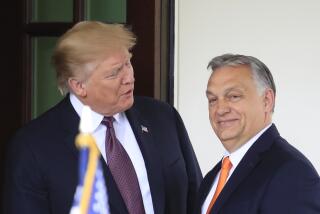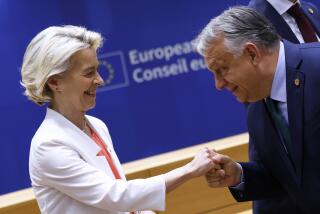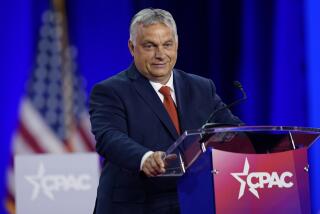Hungarian Leader Drums Up Business in L.A.
- Share via
On a day that included an afternoon visit with his 84-year-old aunt, Hungarian Premier Karoly Grosz said Friday in Los Angeles that he is seeking to promote capitalist investment in his nation.
With Armand Hammer, chairman of Occidental Petroleum Corp., at his side, Grosz said he is lobbying businessmen to invest in Hungary in order to foster the “free flow of capital and goods.”
“We have had very constructive discussions with Dr. Hammer,” Grosz said, speaking through an interpreter at a press conference at Occidental headquarters in Westwood.
Grosz, who succeeded Janos Kadar as head of the Hungarian communist party two months ago, began a 10-day U.S. visit on Tuesday. He is scheduled to meet with President Reagan next week.
Following his meeting with Hammer, Grosz said his country may enter into a joint venture with Occidential to operate a chemical plant near the Caspian Sea. “But what we had discussed with him (Hammer) was still not reality, but a very hopeful future,” the premier said. “And as you know, history does not honor the endeavor, it only honors the success.”
Then Grosz, 57, was whisked to his aunt’s home in Santa Monica. Elizabeth Kron, Grosz’s mother’s sister, emigrated from Hungary in 1936.
Following the reunion, Grosz was scheduled to dine with the California Council on International Trade at the Century Plaza.
Hammer said that glasnost , the openness policy espoused by Soviet leader Mikhail S. Gorbachev, made him optimistic about conducting business in the Soviet Union and other Eastern Bloc countries, especially Hungary.
“I think Hungary is in the forefront of the move of the socialist countries to liberalize,” Hammer said.
A group of protesters outside of the Occidental offices disagreed. Calling themselves the Hungarian Freedom Fighters of Los Angeles, about a dozen people demonstrated, criticizing recent reforms in Hungary--hailed by some as a form of glasnost called “grosznost”-- that they said masked continued oppression.
“We just want to let the American people know that nothing has changed since 1956,” the year Soviet forces crushed a revolution, said the group’s secretary, Laszlo Kovacs.
More to Read
Sign up for Essential California
The most important California stories and recommendations in your inbox every morning.
You may occasionally receive promotional content from the Los Angeles Times.













